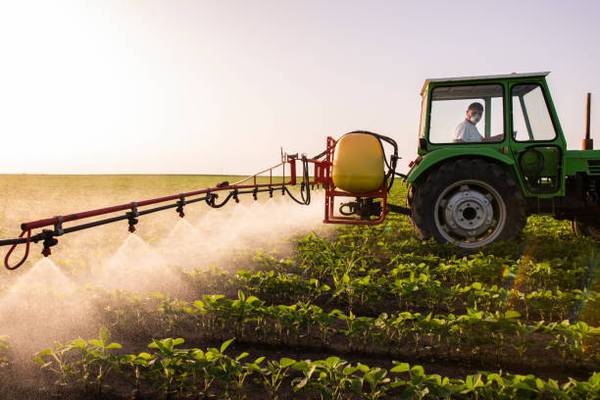Exploring Sprayers In Agriculture
Drafted by: vijaychourey26@gmail.com
Agriculture has come a long way since its early days of manual labor. Today, modern farming practices rely on innovative technologies to boost efficiency and productivity. One such technology that has revolutionized the way crops are cultivated is agricultural sprayers. These machines play a crucial role in ensuring optimal crop health and yield by efficiently applying pesticides, herbicides, and fertilizers. In this article, we will delve into the world of sprayers in agriculture and explore their various types, applications, and benefits.
Understanding Agricultural Sprayers
The Purpose of Sprayers in Farming
Agricultural sprayers are essential tools used by farmers to apply liquids such as pesticides, herbicides, fungicides, and fertilizers to crops. These substances help protect crops from pests, diseases, and weeds while promoting healthy growth. Sprayers ensure uniform and precise application, which is crucial for maximizing the effectiveness of these chemicals and minimizing wastage.
How Sprayers Work
Sprayers work on the principle of converting liquid substances into droplets and distributing them evenly over the target area. They consist of a tank to hold the liquid, a pump to pressurize it, and a distribution system (nozzles, booms, or misters) to disperse the spray.
Types of Agricultural Sprayers
Boom Sprayers
Boom sprayers are mounted on tractors and are commonly used for large-scale field spraying. They have a long boom with multiple nozzles that can cover a wide area in a single pass.
Airblast Sprayers
Airblast sprayers are ideal for orchards and vineyards, as they use high-velocity air to propel the spray, ensuring excellent coverage even on dense foliage.
Backpack Sprayers
Backpack sprayers are portable and suitable for small-scale applications or areas with limited accessibility.
Mist Sprayers
Mist sprayers produce fine droplets, making them suitable for greenhouse and nursery applications.
High-Pressure Sprayers
High-pressure sprayers are designed for precision spraying, especially in horticulture and floriculture.
Factors to Consider When Choosing a Sprayer
When selecting an agricultural sprayer, several factors must be taken into account, such as farm size, crop type, and power source. The right choice ensures optimal performance and cost-effectiveness.
Types Of Agricultural Sprayers
Boom Sprayers
Boom sprayers are a popular choice for large-scale field spraying due to their wide coverage and efficiency. They are suitable for row crops and can cover a significant area in a short time.
Airblast Sprayers
Airblast sprayers are commonly used in orchards and vineyards, where precision and thorough coverage are essential. The high-velocity air helps deliver the spray deep into the canopy.
Backpack Sprayers
Backpack sprayers are lightweight and portable, making them ideal for spot treatments or hard-to-reach areas. They are commonly used in small gardens or nurseries.
Mist Sprayers
Mist sprayers create fine droplets that remain suspended in the air for an extended period. They are well-suited for greenhouse applications and precise foliar spraying.
High-Pressure Sprayers
High-pressure sprayers are designed for precision spraying in specialty crops and flower gardens. The high pressure ensures targeted application, reducing chemical wastage.
Applications Of Agricultural Sprayers
Pest and Disease Control
Sprayers are used to apply pesticides and fungicides, protecting crops from harmful pests and diseases. Early detection and timely treatment are critical for minimizing crop damage.
Weed Management
Herbicides are essential for controlling weeds that compete with crops for nutrients and sunlight. Sprayers ensure targeted application, reducing the risk of herbicide drift.
Fertilizer Application
Fertilizer sprayers distribute essential nutrients directly to the crops, promoting healthy growth and maximizing yield potential.
Crop Growth Enhancers
In addition to protection and nourishment, sprayers are used to apply growth enhancers that improve crop quality and overall performance.
The Advantages Of Using Agricultural Sprayers
Precision and Efficiency
Sprayers ensure accurate and even application of chemicals, minimizing wastage and optimizing the effectiveness of inputs.
Reduced Chemical Usage
With targeted spraying, farmers can use the right amount of chemicals, reducing their environmental impact and production costs.
Time and Labor Savings
Sprayers allow farmers to cover large areas in a short time, reducing the need for manual labor and saving valuable time during critical farming seasons.
Improved Crop Quality and Yield
By providing optimal protection and nutrition, sprayers contribute to healthier crops and increased yield potential.
Factors To Consider When Choosing An Agricultural Sprayer
Farm Size and Terrain
Larger farms may benefit from boom sprayers, while smaller farms could opt for backpack or handheld sprayers.
Crop Type and Layout
Different crops may have varying spraying requirements, necessitating the use of specific sprayer types.
Sprayer Capacity and Range
The tank capacity and spraying range should be appropriate for the farm's size and layout.
Power Source and Fuel Efficiency
Choosing between manual, electric, or fuel-powered sprayers depends on the farm's resources and environmental concerns.
Best Practices For Sprayer Maintenance
Regular Cleaning and Inspection
Cleaning the sprayer after each use prevents chemical buildup and potential cross-contamination.
Calibration and Adjustment
Regularly calibrating the sprayer ensures accurate application rates, avoiding under or over-application.
Storage and Winterization
Proper storage and winterization protect the sprayer from freezing temperatures and extend its longevity.
Future Trends In Agricultural Sprayers
Automation and Robotics
Automation and robotics will enable autonomous spraying, improving efficiency and reducing human intervention.
Integration of IoT and AI
The integration of the Internet of Things (IoT) and Artificial Intelligence (AI) will enable real-time data analysis, optimizing spraying decisions.
Sustainability and Eco-Friendly Sprayers
The industry is moving towards more sustainable and eco-friendly sprayers to minimize environmental impact.







